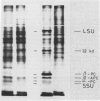Abstract
In the eukaryotic and unicellular alga Cyanidium caldarium the synthesis of the plastid enzyme ribulose bisphosphate carboxylase/oxygenase (RuBPCase) and the light gathering proteins phycocyanin (PC) and allophycocyanin (APC) is under the control of light and glucose, which is a metabolizable carbon source for this organism. Light promotes the synthesis of these proteins while glucose has a strong inhibitory effect on this process. All subunits of the proteins mentioned above are in vitro translation products of poly (A)−-RNA (Steinmüller, Kaling, Zetsche 1983 Planta 159: 308-313). Both factors—light and glucose—exert their effects mainly by modulation of the level of translatable messenger RNA for these proteins. Under autotrophic growth conditions the level of translatable RuBPCase-, PC-, and APC-messenger RNA is high, whereas in the presence of glucose the level of these mRNAs is low or not detectable at all.
Full text
PDF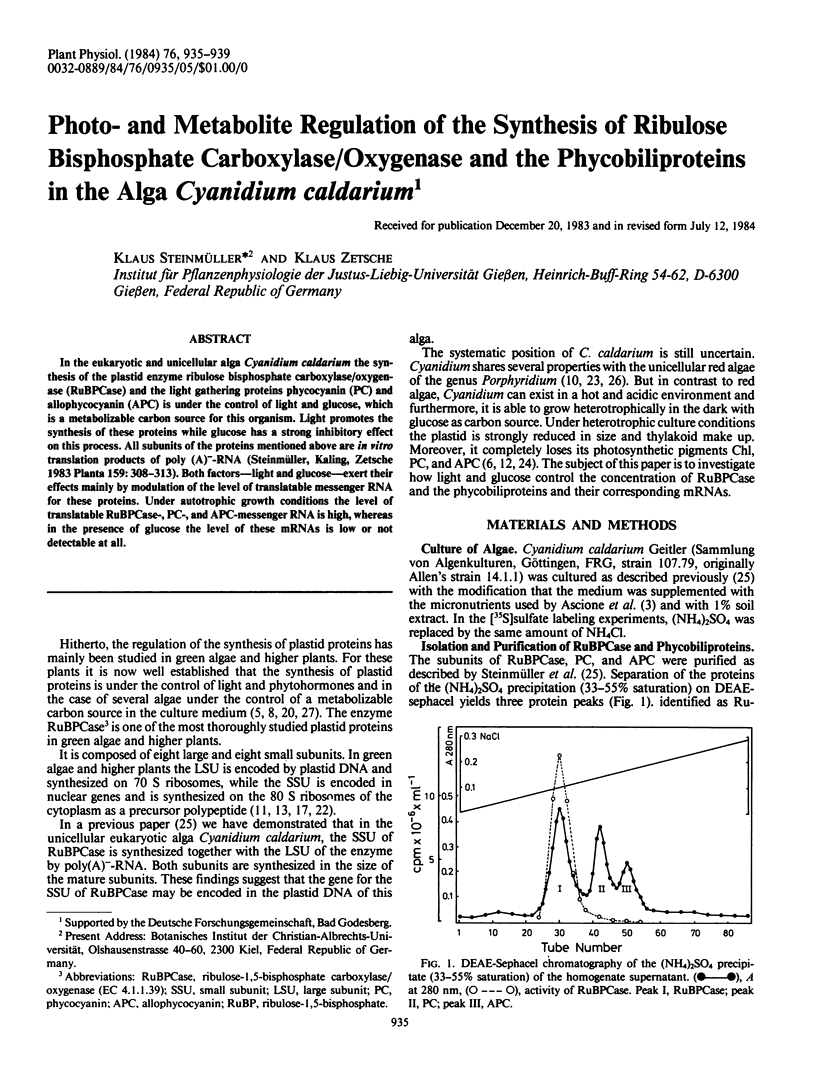
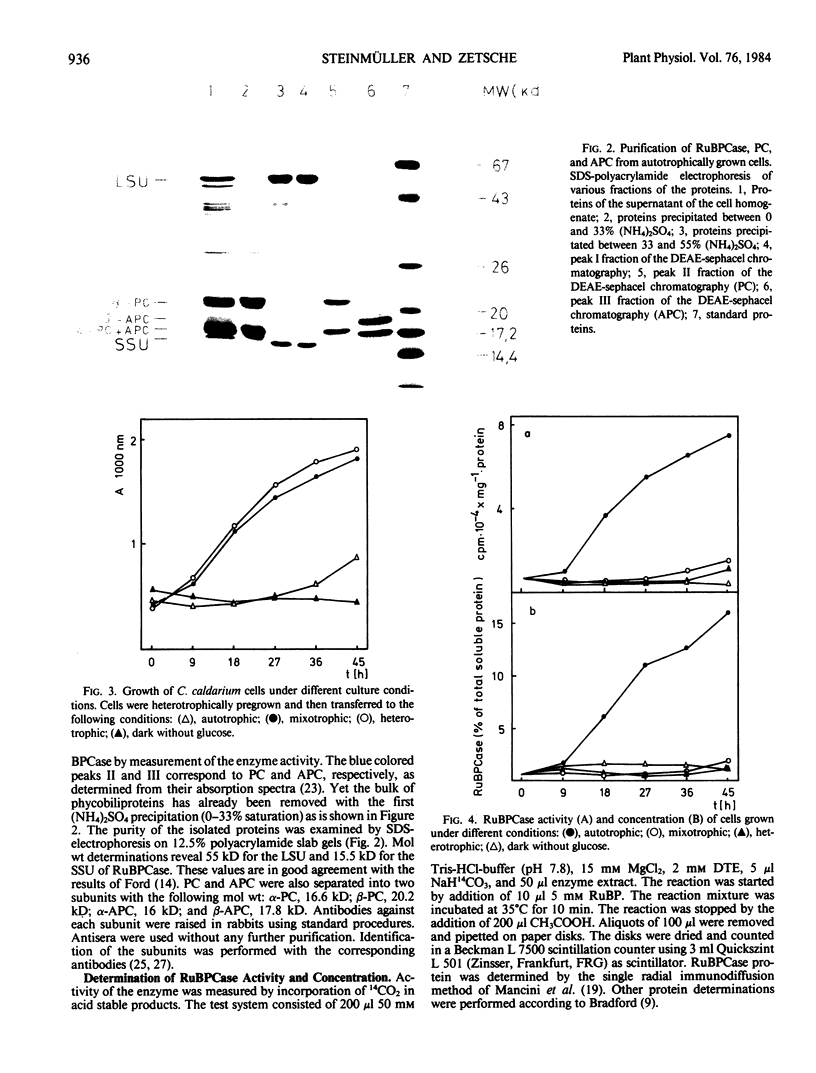
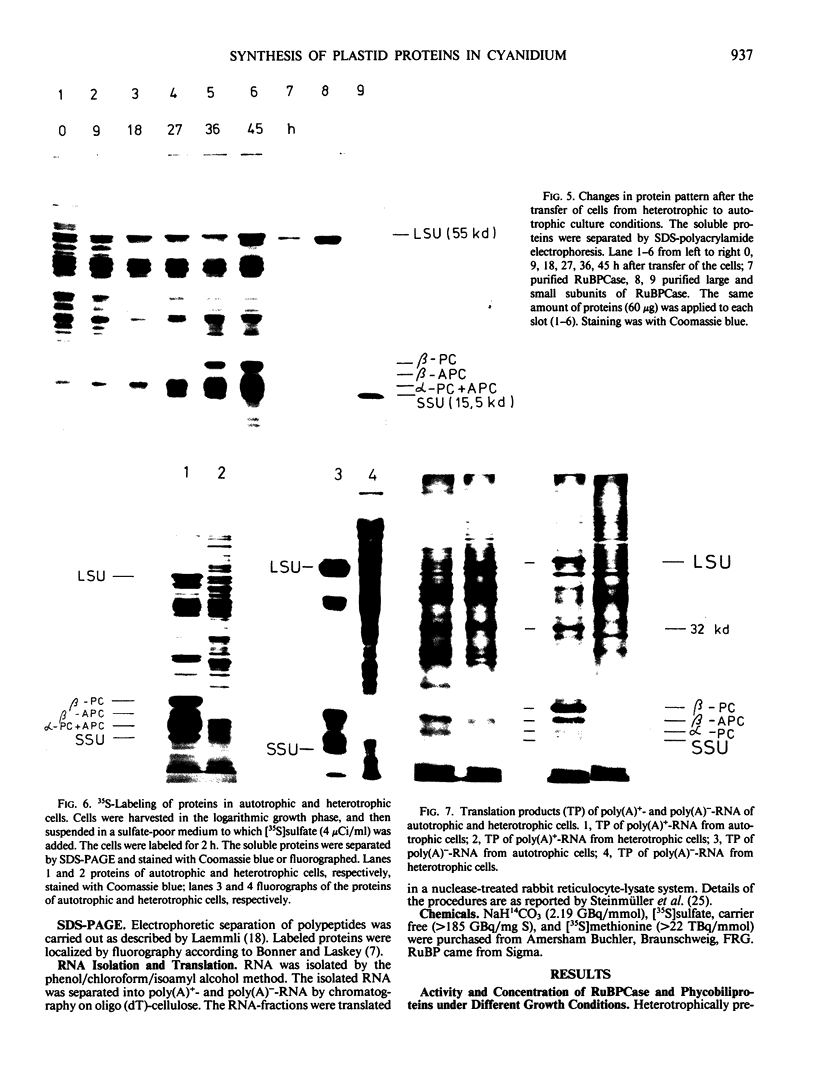
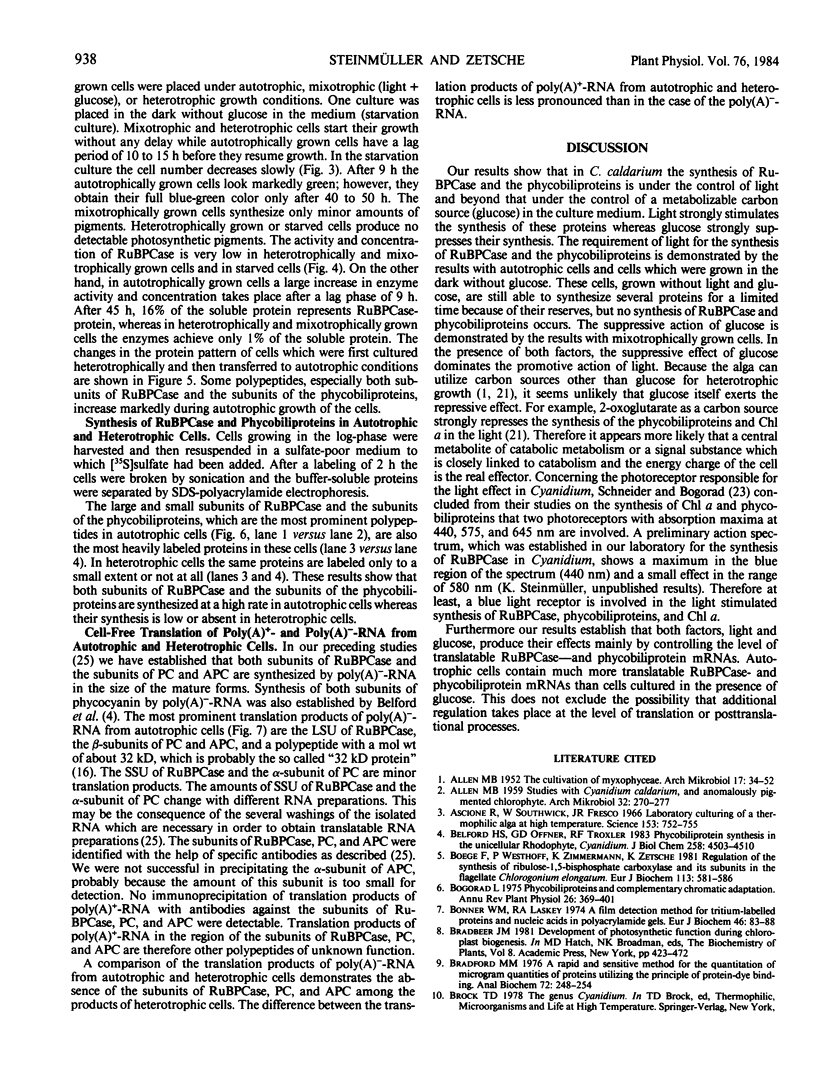
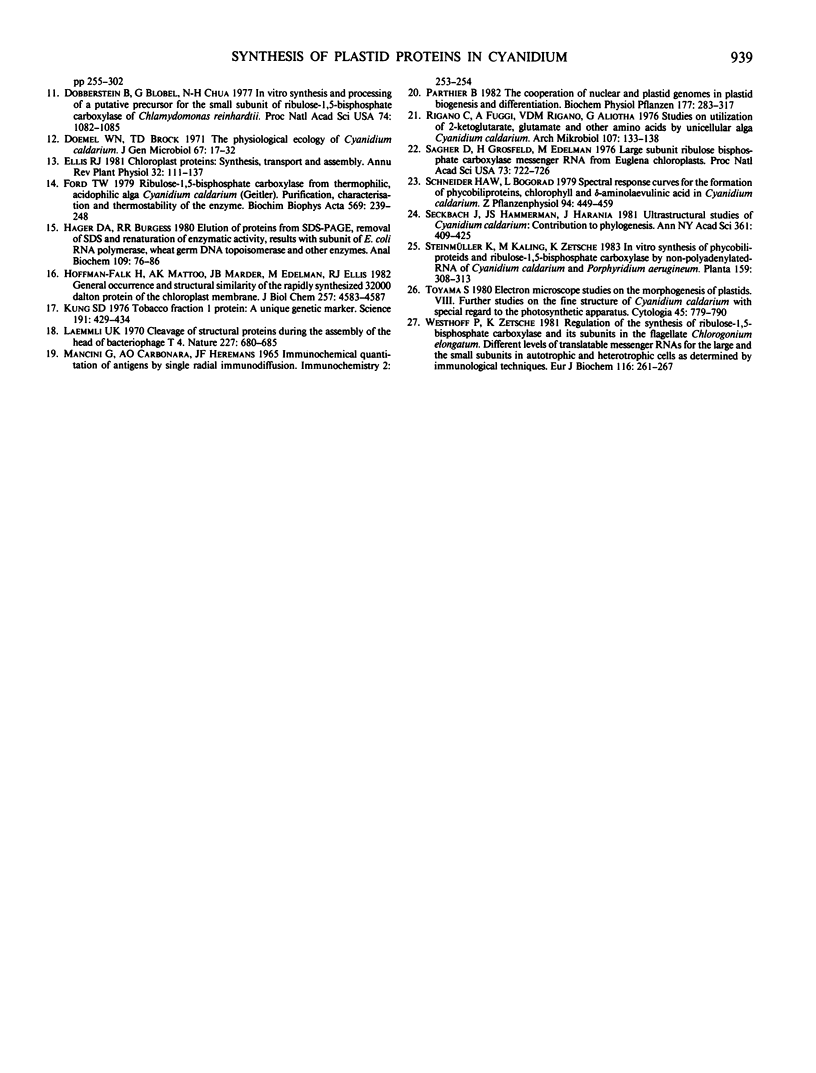
Images in this article
Selected References
These references are in PubMed. This may not be the complete list of references from this article.
- ALLEN M. B. Studies with Cyanidium caldarium, an anomalously pigmented chlorophyte. Arch Mikrobiol. 1959;32(3):270–277. doi: 10.1007/BF00409348. [DOI] [PubMed] [Google Scholar]
- Ascione R., Southwick W., Fresco J. R. Laboratory culturing of a thermophilic alga at high temperature. Science. 1966 Aug 12;153(3737):752–755. doi: 10.1126/science.153.3737.752. [DOI] [PubMed] [Google Scholar]
- Belford H. S., Offner G. D., Troxler R. F. Phycobiliprotein synthesis in the unicellular rhodophyte, Cyanidium caldarium. Cell-free translation of the mRNAs for the alpha and beta subunit polypeptides of phycocyanin. J Biol Chem. 1983 Apr 10;258(7):4503–4510. [PubMed] [Google Scholar]
- Boege F., Westhoff P., Zimmermann K., Zetsche K. Regulation of the synthesis of ribulose-1,5-bisphosphate carboxylase and its subunits in the flagellate Chlorogonium elongatum. I. The effect of light and acetate on the synthesis and the degradation of the enzyme. Eur J Biochem. 1981 Jan;113(3):581–586. doi: 10.1111/j.1432-1033.1981.tb05102.x. [DOI] [PubMed] [Google Scholar]
- Bonner W. M., Laskey R. A. A film detection method for tritium-labelled proteins and nucleic acids in polyacrylamide gels. Eur J Biochem. 1974 Jul 1;46(1):83–88. doi: 10.1111/j.1432-1033.1974.tb03599.x. [DOI] [PubMed] [Google Scholar]
- Bradford M. M. A rapid and sensitive method for the quantitation of microgram quantities of protein utilizing the principle of protein-dye binding. Anal Biochem. 1976 May 7;72:248–254. doi: 10.1016/0003-2697(76)90527-3. [DOI] [PubMed] [Google Scholar]
- Dobberstein B., Blobel G., Chua N. H. In vitro synthesis and processing of a putative precursor for the small subunit of ribulose-1,5-bisphosphate carboxylase of Chlamydomonas reinhardtii. Proc Natl Acad Sci U S A. 1977 Mar;74(3):1082–1085. doi: 10.1073/pnas.74.3.1082. [DOI] [PMC free article] [PubMed] [Google Scholar]
- Ford T. W. Ribulose 1,5-bisphosphate carboxylase from the thermophilic, acidophilic alga, Cyanidium caldarium (Geitler). Purification, characterisation and thermostability of the enzyme. Biochim Biophys Acta. 1979 Aug 15;569(2):239–248. doi: 10.1016/0005-2744(79)90059-7. [DOI] [PubMed] [Google Scholar]
- Hager D. A., Burgess R. R. Elution of proteins from sodium dodecyl sulfate-polyacrylamide gels, removal of sodium dodecyl sulfate, and renaturation of enzymatic activity: results with sigma subunit of Escherichia coli RNA polymerase, wheat germ DNA topoisomerase, and other enzymes. Anal Biochem. 1980 Nov 15;109(1):76–86. doi: 10.1016/0003-2697(80)90013-5. [DOI] [PubMed] [Google Scholar]
- Hoffman-Falk H., Mattoo A. K., Marder J. B., Edelman M., Ellis R. J. General occurrence and structural similarity of the rapidly synthesized, 32,000-dalton protein of the chloroplast membrane. J Biol Chem. 1982 Apr 25;257(8):4583–4587. [PubMed] [Google Scholar]
- Kung S. Tobacco fraction 1 protein: a unique genetic marker. Science. 1976 Feb 6;191(4226):429–434. doi: 10.1126/science.1108201. [DOI] [PubMed] [Google Scholar]
- Laemmli U. K. Cleavage of structural proteins during the assembly of the head of bacteriophage T4. Nature. 1970 Aug 15;227(5259):680–685. doi: 10.1038/227680a0. [DOI] [PubMed] [Google Scholar]
- Mancini G., Carbonara A. O., Heremans J. F. Immunochemical quantitation of antigens by single radial immunodiffusion. Immunochemistry. 1965 Sep;2(3):235–254. doi: 10.1016/0019-2791(65)90004-2. [DOI] [PubMed] [Google Scholar]
- Rigano C., Fuggi A., Di Martino Rigano V., Aliotta G. Studies on utilization of 2-ketoglutarate, glutamate and other amino acids by the unicellular alga Cyanidium caldarium. Arch Microbiol. 1976 Mar 19;107(2):133–138. doi: 10.1007/BF00446832. [DOI] [PubMed] [Google Scholar]
- Sagher D., Grosfeld H., Edelman M. Large subunit ribulosebisphosphate carboxylase messenger RNA from Euglena chloroplasts. Proc Natl Acad Sci U S A. 1976 Mar;73(3):722–726. doi: 10.1073/pnas.73.3.722. [DOI] [PMC free article] [PubMed] [Google Scholar]
- Seckbach J., Hammerman I. S., Hanania J. Ultrastructural studies of cyanidium caldarium: contribution to phylogenesis. Ann N Y Acad Sci. 1981;361:409–425. [PubMed] [Google Scholar]
- Westhoff P., Zetsche K. Regulation of the synthesis of ribulose-1,5-bisphosphate carboxylase and its subunits in the flagellate Chlorogonium elongatum. Different levels of translatable messenger RNAs for the large and the small subunits in autotrophic and heterotrophic cells as determined by immunological techniques. Eur J Biochem. 1981 May 15;116(2):261–267. doi: 10.1111/j.1432-1033.1981.tb05328.x. [DOI] [PubMed] [Google Scholar]






